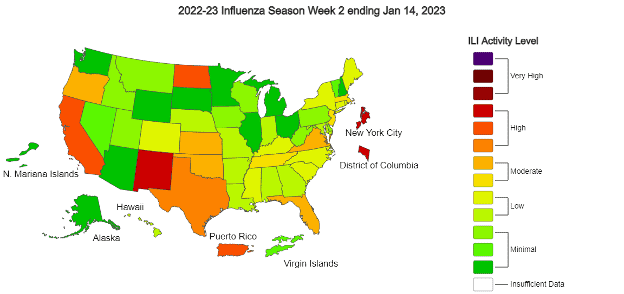The winter months are known for bringing increased levels of illness as people spend more time
indoors keeping warm. This winter we’ve seen increased levels of respiratory viruses that some
have called the “Tripledemic.”
The CDC’s interactive online application, FluView, shows Texas’s “high” levels of influenza-like
illness (ILI), putting Texas in the top 5 states for activity levels.

Respiratory Syncytial Virus, RSV, is usually seen during late fall, winter, and early spring. Since September, RSV case numbers in Texas have been higher than in recent years. These numbers, paired with higher Flu cases than normal and increasing COVID cases, are putting additional pressures on our healthcare system.
RSV, Flu, and COVID are all respiratory viruses affecting the network of tissues and organs that help you breathe. A cough, runny nose, and fever are common symptoms of all respiratory viruses, and a laboratory test is usually necessary to make an accurate diagnosis. However, there are some subtle differences between RSV, Flu, and COVID that can help you distinguish between them.
RSV
Symptoms of RSV include the common symptoms of respiratory viruses, a cough, runny nose, and fever. A unique symptom of RSV is wheezing, which sounds like a whistle or a rattle when your child breathes.
RSV can infect people of any age, but it is most serious for young children and older adults. Most children recover from RSV on their own, but it can sometimes lead to more severe illness, such as Bronchiolitis or Pneumonia.
Flu
Along with a runny nose and cough, the Flu often causes a very high fever of 103 or 104 degrees Fahrenheit and can include nausea and vomiting. An upset stomach isn’t unique to the Flu, but it can often be worse than with other viruses.
Most flu infections won’t cause complications, but children under 5, and especially under age 2, are at higher risk. Possible complications include dehydration; inflammation of the heart, brain, or muscle tissue; pneumonia; and sinus and ear infections.
Click here for more Flu information from Ally Medical.
COVID
The symptoms of COVID-19 are similar to flu and RSV, but, unlike the other viruses, COVID-19 can have a serious effect on body systems outside the lungs. Several symptoms you may think are unique to COVID-19 are actually common among respiratory viruses, including loss of taste and smell and gastrointestinal issues.
Click here for more COVID information from Ally Medical.
Testing and Medical Care
Getting tested when you show symptoms can be critical to stopping the spread and managing symptoms. At-home rapid COVID tests can detect COVID illness, and a PCR test sent to the lab can confirm COVID, Flu, or RSV. If you have any respiratory illness symptoms or receive a positive test, you should isolate to reduce the spread of the disease. Early detection of flu may give you the option to take Tamiflu to reduce the duration of your symptoms.
As with any respiratory infection, you should call a doctor immediately if you have trouble breathing, experience severe vomiting and diarrhea to a point where you are no longer able to eat or drink if your symptoms aren’t improving or getting worse after five days. Each of these viruses are potentially more severe in the very young or very old or those with preexisting conditions.
With the strain on hospitals and doctors increasing this winter, having an option like Ally Medical can not only save you time, but can provide you with expert care. Ally Medical operates six freestanding emergency rooms in Texas with locations in Bastrop, South and Central Austin, Clear Lake, Round Rock, and Spring. There are no appointments needed, and patients may come in any time–day or night–with little to no wait. Each Ally Medical Emergency Room is equipped to treat both minor and major medical emergencies for children and adults of all ages in a safe, stress-free setting. If you can’t get in to see your primary care physician or don’t have one, visit any Ally Medical facility to experience our re-envisioned medical care.



